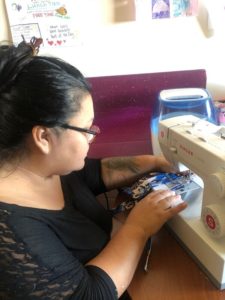Two months ago, Eleanor Montecino was juggling her technical theatre classes at East Los Angeles College (ELAC), two set design projects, and life as a single mother.
She worked day and night, running from one part of L.A. to another as she painted and constructed a run-down 1974 Vancouver hotel (as the set designer for an ELAC production of Carmen Aguirre’s The Refugee Hotel), as well as a fairground, a bar, and an airplane (as a scenic charge for East West Players’ mounting of Stephen Sondheim and John Weidman’s Assassins). She did this while working through her coursework and managing all the homework, allergies, and meltdowns that come with raising three children.
In an ideal world, Montecino would have watched The Refugee Hotel open later this month. Instead, she rarely leaves her apartment in L.A.’s Monterey Park neighborhood. She now spends her time applying for jobs and sewing masks for her family using a machine lent to her by her school. With her jobs as a set designer deemed non-essential, Montecino now lives off her savings and gets a little help from her community in the form of drive-through food banks and food stamps. Her kitchen table is her office, her work station, and a classroom for her teenage son and two little daughters.
While Montecino describes her situation as “lucky,” this pause has been extremely hard for her as she manages her children’s health and education as well as her own.
“No shows will be open, so no scenic painting at East West for me,” she said. “I will continue going to school as planned. However, I do question if I should. This pandemic showed me that the entertainment artist industry is not [considered] essential. I am out of work, and as a single mother and student, the career I planned for myself doesn’t look very secure.”
According to a 2019 report by the National Center for Educational Statistics, more than 2.75 million college students were expected to graduate this spring. While entering the job market can be difficult any year, the economic consequences of the COVID-19 pandemic have increased these challenges exponentially.
“Forging a career in theatre has always been a challenging endeavor,” said Tony Hagopian, executive director of the University/Resident Theatre Association (URTA) in New York, “and it will be more so at the end of this.”
While the changes wrought by this pandemic could not be avoided, Hagopian said, the precise effects of these changes on theatre—and the theatre job market—are wildly uncertain. “I think it’s still too early to try and predict the future,” he said. “There has been a lot of news about immediate adaptations: new plays becoming ‘radio plays’ or streaming events, theatres conceiving a fall season of one-person shows and audiences seated three seats apart. But who knows how much of that we hold onto once there’s a vaccine or treatment for coronavirus?”
Hagopian does feel that current events have accelerated some changes that were already taking place. For example, self-taped auditions were rapidly becoming an industry standard in New York and Los Angeles. Now those who hope to break in as performers should use this time to update themselves on the technology needed to record their own material.

Along those lines, Yue Yat Gi, a fellow student at ELAC, is preparing for a world with an entirely different, more technologically driven concept of theatre. Yue worked as a lighting designer on ELAC’s production of The Refugee Hotel, which is now in the process of being converted into a creative digital version. As a result, she is working on a digital background instead of focusing on the physical lighting, as she would have before the pandemic.
Many theatre companies are contemplating similar switches, and Camille Schenkkan, the interim director of the Education & Community Partnerships department at the Center Theatre Group in Los Angeles, believes some of these changes are going to be long-lasting, if not permanent.
“There’s interesting work happening in artistic content creation, and there are exciting conversations in other areas of theatre—lighting and costume design, stage management, direction, etc.,” Schenkkan said. “I think the more students can focus on their creative aesthetic and the art they want to make, the better they’ll be served.”
Still, she clarified, “No one is going to hire someone solely because they can create using a certain platform. You’re still going to be hired for your creativity, work ethic, and talent. Any new or emerging technology knowledge is a bonus.”
Schenkkan also noted that some upsides can be found amid the industry-wide slowdown. For instance, she said, it’s much easier now to grab 20 minutes with a professional via Zoom or over the phone and ask them for advice on building a career.
“I think this is a great opportunity,” Schenkkan said, “for emerging artists to focus on building companion skills that will be essential to sustaining a career in the arts: researching contracts and unions, building their financial literacy and budgeting skills, and reaching out to people they admire for informational interviews.”
Meanwhile, Montecino knows that theatre may not be the most viable career option for her in the near and foreseeable future. Still, she remains hopeful, following Schenkkan’s playbook of reaching out to professors and industry professionals she knows for advice. These mentors have encouraged her to widen her repertoire of skills. For the time being, Montecino is willing to work as an office assistant, and has offered up her artistic skills for any art-making tasks people may have, as well as teaching art to children.
Many newcomers and aspirants have similarly put theatre ambitions on hold as they try to get by. Some, like Montecino, are able to get some help from their friends and neighbors in the meantime. But countless others have no gigs and no support at all. They are jobless in every sense of the word.
Indeed, with no classes to attend and job prospects evaporated, theatre graduates are at a loss, quite literally. Aaron Espinosa, a student at Cypress College in Los Angeles and former education intern at CTG, is getting by on unemployment benefits. So is David Jimenez, a 2019 graduate from UCLA who was laid off from his job as an advancement coordinator for a nonprofit arts education organization.
But Espinosa, while disappointed for the time being, said he has a lot of faith in the theatre industry. “The greater part of me believes that there are endless stories that have the power to transform lives and inspire people,” he said. “While it may be easier to abandon it all, I must remain optimistic for myself and others that we can come out of this stronger than ever. It’s key to our collective healing process.”
Espinosa feels strongly that theatre will become a necessity for people’s emotional recovery from the pandemic and its aftermatch in the years to come. And Jimenez, who is looking for entry-level opportunities in arts education, such as fellowships and apprenticeships at regional theatre companies, has a similarly upbeat outlook.
“I’ve always been interested in working in socially/politically conscious arts spaces,” Jimenez said, “and I’m a firm believer that theatre can be a tool for change and healing.”
Getting an industry back on its feet won’t be easy, but young artists are bracing themselves for the task. Most importantly, they have hope. Montecino, for one, is looking forward to getting back on her feet. She knows that it will take time and that it may not involve working directly in theatre any time soon. But she said she’s not disillusioned, and one day hopes to see The Refugee Hotel onstage, ideally with her son and her little girls at her side.
“It’s going to be tough,” Montecino said, “but I have faith that I will somehow do it.”
Shrishti Mathew is a Magazine, Newspaper, and Online Journalism graduate student at Syracuse University.


